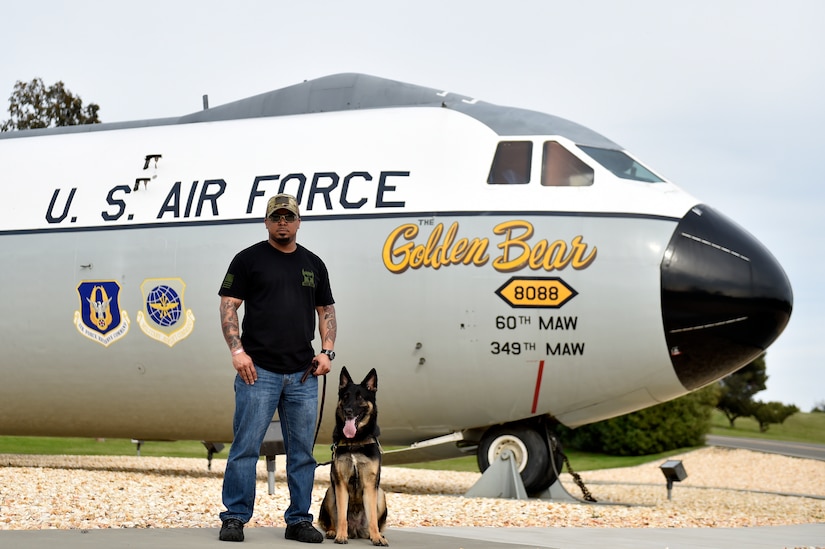TRAVIS AIR FORCE BASE, Calif. -- What if you are screaming
for help, but no one can hear you? What if your life starts to crumble? Do you
know where to turn or what options are available to veterans and service
members?
That is exactly how retired Air Force Tech. Sgt. Brandon
Jones felt as he reached a breaking point in his military career and decided it
was time to reach out to military agencies to get the help he desperately
needed.
Jones reminisced on his childhood days growing up in
Fayetteville, Georgia, and his love for airplanes.
“My dad would take me to the store and ask what I wanted for
my birthday,” Jones said. “I would always pick an airplane. I just loved them
so much.”
Post-Traumatic Stress Disorder
His love for airplanes is what brought him into the Air
Force where, he honorably served for 11 years until he was medically retired
due to post-traumatic stress disorder. The National Center for PTSD at the
Department of Veterans Affairs describes PTSD as a mental health problem that
some people develop after experiencing or witnessing a life-threatening event.
Jones served seven tours overseas as a logistics planner in
support of operations Iraqi Freedom and Enduring Freedom.
“The level of stress that the combat tours bring takes a
toll on you mentally, physically and psychologically,” he said. “It was hard to
come home and adjust.”
Jones said he found himself coming home and being angry all
the time. All he wanted was to be left alone.“I’d often have nightmares and
flashbacks about my comrades that didn’t get to come home with me,” he said.
“I’d feel guilty, and I kept asking myself what I could have done differently?”
Seeking Help
After years of silence, he decided it was time to seek help;
he reached out to the local chaplain and visited the mental health office. “I
desperately needed help,” he said. “I was figuratively drowning and I needed a
helping hand.”
While searching online for answers or others who might be
going through the same problems, Jones found the link to a website for service
dogs. He reached out to Carol Borden, founder and executive director of
Guardian Angels Medical Service Dogs in Williston, Florida, hoping he could
find the answer he had been looking for.
“My medications weren’t doing it for me, my counselors
weren’t doing it for me, and the therapy wasn’t doing it for me,” Jones said.
Individually trained medical service dogs can be obtained
through nonprofit organizations such as Guardian Angels, Freedom Service Dogs,
K9s for Warriors and many other organizations that rescue, raise, train and
then donate these service dogs to veterans. After reviewing his application,
Borden decided Jones was the right candidate to receive a service dog.
“I want to make it possible for people like Brandon to get
the help they need through our amazing dogs,” Borden said. “We custom train
each one of our dogs to mitigate the challenges that someone might be having.”
Jones visited the dog farm weekly while waiting to be paired
with the right service dog. He needed a service dog that could alert him during
PTSD triggers and help him ease through those anxieties.
Apache Provides Comfort, Companionship
“Never did I think that I would have a dog that would help
me get back to a stable life,” Jones said. “If I’m having nightmares, he will
literally come and lick me until I wake up. When he senses an anxiety attack,
he will put himself on me and he will force me to pet him.”
Jones credits his service dog, Apache, for saving his life.
“It’s been a life-changing experience for me,” he said. “He
is the reason why I can go outside now. He is the reason why I can interact
with people. And, most importantly, I can spend time with my family again.”
Jones urges others who may be going through a similar
situation to reach out to military agencies that can help them get PTSD
treatment.
“If one option doesn’t work, there is always something else
available,” he said. “For me, the answer was getting a service dog. But every
person heals differently. Find what works for you and know there is light at
the end of the tunnel.”
No matter where you live, PTSD treatment in the Department
of Veterans Affairs is available. According to the National Center for PTSD,
each medical center within VA has PTSD specialists who provide treatment for
Veterans with PTSD and there are nearly 200 specialized PTSD treatment programs
throughout the country.








No comments:
Post a Comment